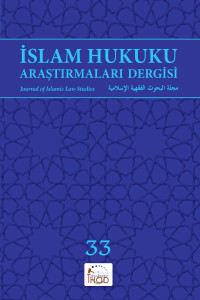Abstract
İslam hukuk metodolojisinde yöntem sorunu bağlamında incelenen istikrâ, cüz’îlere dayanarak bütün hakkında hükme ulaşmaktır. Usulcüler istikrâyı tam istikrâ ve nâkıs istikrâ şeklinde ikili bir taksime tabi tutmuşlardır. Tam istikrâ, bütün cüz’îlerin tek tek incelenmesi sonucu varılan hükmün küllî için geçerli olmasıdır. Bu istikrâ türü kat‘î bilgi sağladığı için bütün usulcüler tarafından şer‘î hüccet sayılmaktadır. Nâkıs istikrâ ise, küllîyi meydana getiren cüz’îlerin çoğunu veya bir kısmını inceleyerek o küllî hakkında genel bir hükme ulaşmaktır. Bu tür istikrâ zan ifade ettiği için fıkıhta şer’î bir hüccet sayılıp sayılmaması usulcüler arasında ihtilaflıdır. Hanefîler metodolojik olarak onu şer‘î deliller arasında saymamaktadırlar. Buna karşılık bir küllîye ait cüz’îlerin çoğunluğu veya bir kısmı tek tek incelenerek bir hükmün elde edilmesi, tartışma konusu edilen fıkhî meselenin de aynı hükme tabi olacağı kanaatini verdiğini gerekçe gösteren cumhur nâkısistikrânın da şer‘î bir hüccet olduğu görüşündedir. İstikrâ metodu, hükmü Kitap, sünnet, icmâ ve kıyasla belirlenemeyen fıkhî meseleleri çözüme kavuşturmak bakımından önemli bir fonksiyonasahiptir. Şöyle ki fıkhî bir problemle karşılaşan ve çözüm arayan fakih her şeyden önce karşılaştığı meseleyi bütün önemli özellikleri ile tespit eder. Daha sonra benzer örneklerden yola çıkarak ulaşılan genel hükmü göz önünde bulundurmak suretiyle problemi çözebilir. Bu aşamadaki faaliyetinin istikrâ metoduna dayanması kaçınılmazdır. Bu çalışmada usulcülerin istikrâyı hukuk metodolojisinde bir yöntem olarak kullanıp kullanmadıkları ve fakihlerin de onu fıkhî meseleleri çözümlemede ne ölçüde kullandıkları işlenmiştir. Bu bağlamda istikrâ metodu ele alınmış ve fıkhî meselelerin çözümünde nasıl kullanıldığı üzerinde durulmuştur. Cumhurun ortaya koyduğu ve şer‘î bir hüccet olarak sahiplendiği istikrâ metodu için söz konusu edilen problemlere istinaden karşılaştığı eleştirilere de yer verilmiş ve istikrâ metodunun işleyiş şekli üzerinde durulmuştur.
Abstract
In the Islamic law methodology, the induction, which is examined in the context of the method problem, is to reach a verdict on the whole, based on singularities. The Methodists have subjected the induction to a double classification as complete induction and incomplete induction. The complete induction is that the verdict is valid for the whole, as a result of the examination of all singularities. This type of induction is a religious hujjat (argument) by all methodologists because it provides precise information. Incomplete induction is the examination of most or some of the singularities that make up the whole. There is controversy among the methodologists about whether or not this inductive implies religious evidence in the jurisdiction. Hanafians do not regard it as methodological evidence. On the other hand, the majority of the singularities of a whole are examined by examining one by one and the conclusion that the lack of the majority is a religious document, which gives the reason that the disputed subject matter will be subject to the same provision. The inductive method has an important function in resolving the provisions of the Book, circumcision, ilm and unspecified fiqh. Namely, faced with a fiqh problem and seeking solutions, a fakih, first of all, identifies the matter he encounters with all his important features. Then, he can solve the problem by considering the general provision reached based on similar examples. It is inevitable that the activity of this stage will be based on the inductive method. In this study, it is explained whether the methodists used the induction method as a method in the law methodology and to what extent the fakihs used it in analyzing juridical issues. In this context, the inductive method has been discussed and how it is used in the solution of jurisprudence. In addition, criticisms of the inductive method, which are presented by the majority as a religious document, are also included and the way of the induction method is emphasized.
Details
| Primary Language | Turkish |
|---|---|
| Subjects | Religion, Society and Culture Studies |
| Journal Section | Research Articles |
| Authors | |
| Publication Date | April 30, 2019 |
| Submission Date | October 1, 2018 |
| Published in Issue | Year 2019 Issue: 33 |


